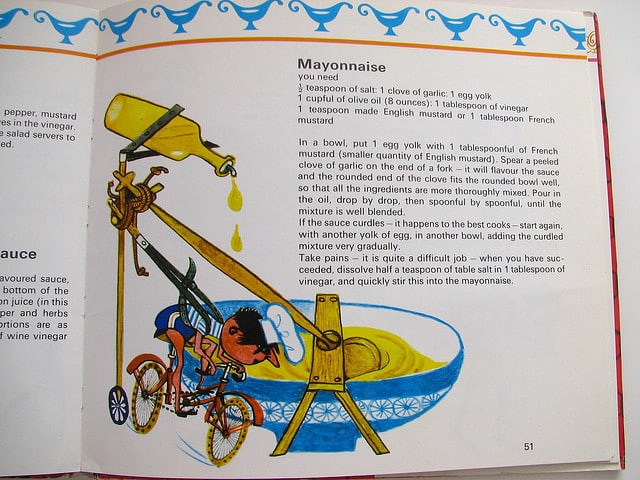Katie McCaskey
July 8, 2013
No Comments

Bedtime stories are important — but it looks like childhood cooking lessons are increasingly important too.
Learning to cook can be one key to childhood obesity prevention and a lifelong association with healthy eating. There’s just one (big) problem: Have you received cooking lessons growing up?
For many parents today the answer is no. Their working parents were too harried to teach cooking, and modern life seemed to go along with food convenience. Additionally, “home economics” courses were struck from the national curriculum as “old-fashioned” or to streamline budgets, and kicked to the curb alongside arts and physical education.
As a result, many parents today parents lack cooking knowledge and experience themselves. This places all of us at a huge disadvantage… and exactly where the food industry would prefer to keep us.
It’s no secret that an intentionally deskilled population makes for greater consumer dependency.
“You’re not going to reform the way we farm and process food unless you cook. Local food isn’t going to get big if people aren’t cooking. If you let corporations cook for you, they’re going to buy food from the biggest monocultures,” author Michael Pollan tells Michelle Edelbaum in the May/June 2013 issue of EatingWell magazine.
In Pollan’s newest book, Cooked, he writes that learning to cook can help “people living in a highly specialized consumer economy reduce their sense of dependence and achieve a greater degree of self-sufficiency.” It is not just a matter of self-esteem. It is a matter of self-preservation in the form of harm reduction. Yes, reduced harm from the corporate food interests that do not have anyone’s well-being ahead of profits. Enter, Slow Food, kiddie-style.
People who know how to cook tend to have a lot of advantages. For instance, they know how to budget and plan. By cooking and preparing meals they may also avoid many of the hyper-formulated sugary/salty/and fatty factory foods that lead to food addiction. Jenny Stamos Kovacs writes at WebMD that learning to cook may also help you resolve some psychological issues with food, too.
Cooking — at age-appropriate levels — can teach the following:
- Proper planning — everything from how to purchase, grow, obtain, or recombine ingredients and leftovers;
- Budgeting, so meals offer the best financial value while still being tasty and varied;
- Nutrition basics to ensure children learn how to eat and prepare a variety of fruits, vegetables, and protein sources;
- Time management to prep or prepare a meal in its entirety;
- Measurement, units, and mathematics — and some science — to ensure baked goods rise and water boils.
That’s not all the benefits.
Let’s not forget cooking can also enhance reading skills, offer the opportunity to explore different cultures and/or historical lessons, and expand the palate so kids will be more willing to try new foods as adults. Also, you appreciate food you prepare yourself more. It is less likely to be wasted and less likely to be binged.
Although daunting, parents can teach themselves plenty by attempting a recipe first and and then teaching it to their children. Timothy Ferris, author of The Four Hour Chef, claims people can learn to cook in just four hours using his DISSS method: deconstruction, selection, sequencing, and stakes. The last part, stakes, refers to setting an incentive deadline to learn — perhaps cooking a large meal for guests at an upcoming holiday.
Cooking is one of those activities where families can learn and enhance their skills together. Today’s parents are no less harried and busy, but as Pollan tells Edelbaum, for too long we’ve put pressure on the kitchen to save time. We burn that time elsewhere, but cooking “[Is] important — for your health, your family life and your sanity.”
Of course, cooking and baking can also be creative outlets. Who knows what child will grow up to be a star chef? Perhaps more powerful, which child will grow into a superstar parent who can share cooking skills with another generation?
Source: “EatingWell Interviews Author Michael Pollan About His Book, ‘Cooked,'” EatingWell, May/June 2013
Source: “Cooked: A Natural History of Transformation,” MichaelPollan.com, 05/23/13
Source: “Children and Food,” Slow Food USA
Source: “Healthy Cooking Tricks,” WebMD
Source: “Can You Really Learn to Cook in Four Hours?,” Daily Mail, 01/27/13
Image by Frances.


![[montage of junk food]](http://childhoodobesitynews.com/wp-content/uploads/2014/07/the-pleasures-of-life_1144.gif)


 FAQs and Media Requests:
FAQs and Media Requests: 











